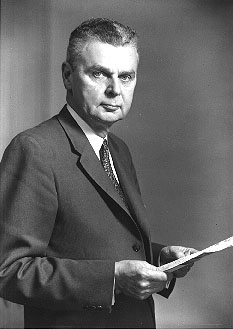[The Liberals]1 bit the dust because they treated Parliament with contempt.2
 BT Richardson’s Canada & Mr. Diefenbaker is a book which isn’t so much about the then-Prime Minister, but is more about Canada in 1962. I thought it was really ambitious to write a biography of a sitting Prime Minister, but I was mistaken, Richardson wasn’t talking about Diefenbaker’s childhood and early years, he was talking about Canada. Even in the few chapters that did discuss Diefenbaker was more interested in painting the picture of a family living in rural Ontario3 and moving out to Saskatchewan to start a new life with free land and the great opportunities of this new western expansion. The specifics of Dief and his parents is barely touched upon, thus creating a classic Canadian story which could be related to by most 1960s Canadians. Instead of Diefenbaker as a person, Richardson discusses Canada’s place in North America, the Commonwealth, bank policies, the downside of the Leader of Her Majesty’s Loyal Opposition Lester B. Pearson4,
BT Richardson’s Canada & Mr. Diefenbaker is a book which isn’t so much about the then-Prime Minister, but is more about Canada in 1962. I thought it was really ambitious to write a biography of a sitting Prime Minister, but I was mistaken, Richardson wasn’t talking about Diefenbaker’s childhood and early years, he was talking about Canada. Even in the few chapters that did discuss Diefenbaker was more interested in painting the picture of a family living in rural Ontario3 and moving out to Saskatchewan to start a new life with free land and the great opportunities of this new western expansion. The specifics of Dief and his parents is barely touched upon, thus creating a classic Canadian story which could be related to by most 1960s Canadians. Instead of Diefenbaker as a person, Richardson discusses Canada’s place in North America, the Commonwealth, bank policies, the downside of the Leader of Her Majesty’s Loyal Opposition Lester B. Pearson4,
Richardson talks at length about James Coyne, who was at one time Governor of the Bank of Canada. His policies were at odds with the Tory government. Thusly, six months before his contract expired, Diefenbaker’s government passed a bill through the Lower House which would relieve Coyne of his job. It was vetoed by the Liberal-held Senate. His statements on the Senate seem to frame Canada in this frozen political landscape.
The Senate’s rarely used power of veto has never been accepted by the Canadian voters as a true curb on representative government. On the other hand, it has never been repudiated by the voters, either. The Coyne affair brought closer the day of Senate reform, which has never quite materialized.
The Canadian Senate has one hundred and two members5, when it has no vacancies, and its working force is only a fraction of that number.
And it doesn’t stop there. Richardson’s descriptive of his pre-centenial Canada’s issues seems to mirror many of the 21st-century Canada’s issues, but there are two distinct differences between between modern Canada and that of Diefenbaker’s Canada. We read about the Progressive Conservative party which Diefenbaker was the leader of, and we cannot help but see more similarities between that party and the Liberal Party than we can see between the PCs and the Harper led Conservative Party of Canada. Diefenbaker came out of rural Saskatchewan, and fought to make the PCs a viable party in a land dominated by the Social Credit party and Co-operative Commonwealth Federation (who would later become the NDP). Yes, western Canada was once dominated by the left-wing values of the NDP.
Finally, the other major difference is the Canada that Richardson knows is a Canada of pioneers who came from the United Kingdom and France. They colonized the lands we know now. The Canada I know is a land of immigrants. Canada has seen so many immigrants come into our nation that it is no longer English and French, it’s now every ethnicity known to man.
Another worry that Richardson was that Canada was slowly getting more and more confident and less and less of an inferiority complex, I’m not sure why he saw it leaving, but he predicuted that “the risk that Canadians now run is that they will present to the world the image of materialistic, loud mouthed people with pockets stuffed with money.” Something that only recently happened for the first time, and that was during the Vancouver 2010 Olympics.6
I’m finally going to end with a quote of former foreign minister Sidney Smith’s which was quoted in the book. He was discussing Canadian and American cooperation, and these are words that I wish George W. Bush had taken to heart.
True Friendship cannot be wrecked by honest frankness.
- Specifically Louis St. Laurent. [↩]
- The Liberals lost the 1957 election, but had been in power since Mackenzie King’s regained power in 1935. For those bad at math, that’s 22 years. [↩]
- William Diefenbaker actually lived in Todmorden, which is a few metres from my Toronto house. [↩]
- Something I hope he regretted when Pearson proved himself to be one of the greatest Canadian Prime Ministers. [↩]
- One hundred and five today. [↩]
- Can you blame us? We won the Olympics! [↩]